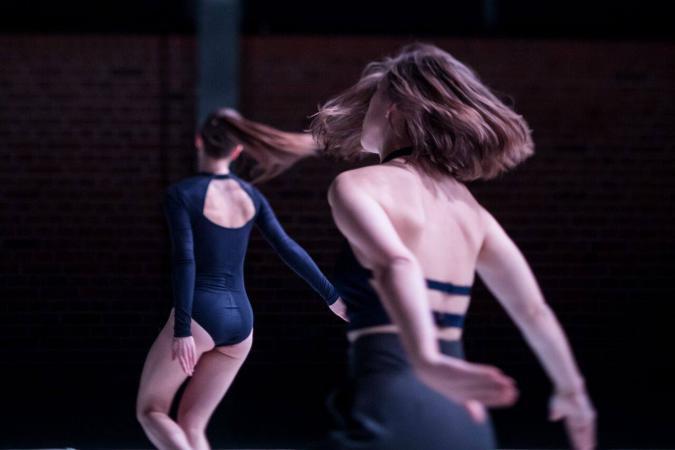
Don’t Go... Photo: Jakub Wittchen. Courtesy of Art Stations Foundation by Grażyna Kulczyk
As part of the Dance Activism. Spaces of Choreography cycle, the Nowy Theatre in Warsaw (ul. Madalińskiego 10/16) will present Don?t Go for Second Best, Baby! Disc 1 choreographed by Ania Nowak, Lo?e Fuller: Research choreographed by Ola Maciejewska (Monday, Tuesday, 12-13 June 2017). Additionally, on 12 June (8 pm), the Theatre will host the MAPA project. The project will be hosted by the artists featured in the Dance Activism cycle, as well as other professional choreographers. In the course of individual conversations, the hosts will share their takes on choreography, their interpretations of the notion, and the way they practice it. MAPA will take place at the theatre?s foyer, where fifteen experts will wait for their interlocutors at conversation tables. The talks will be conducted in four 15-minute rounds. Everyone can map their conversation itinerary, choosing their artist interlocutors and indicating whether they want to ask them a question, or talk on a subject proposed by a given artist.
Don?t Go for Second Best, Baby! Disc 1
Don?t Go for Second Best, Baby! Disc 1 is a choreography of support and disclosure. Backup dancing is about the bodies exercising their relation to the centre, to one another and to choreography understood as a shared, spontaneous plan. This dance is made collectively out of many intersecting monologues.
Lo?e Fuller: Research
The artist explores the boundaries of human autonomy, and the autonomy of the object in motion. Lo?e Fuller: Research comprises two exercises. They emphasise the similarity between the sculptor (human being) and the sculpture (non-human object), on the one hand, and the material autonomy of the human body and the autonomy of the artefact (dance costume), on the other hand. The continuous relationship between the latter is akin to the act of creating a sculpture.
Tickets: PLN 35/25 for a single show, PLN 60/40 for both shows (Ania Nowak and Ola Maciejewska).
MAPA
MAPA enables its participants to embark on an individual journey along a customized trail through choreographic landscape.
Admission free! First round begins at 8 pm. The number of participants is limited.
***
Dance Activism. Spaces of Choreography
Curators: Maria Stokłosa, Magdalena Ptasznik, Eleonora Zdebiak
A series of seven works by Polish choreographers: Alex Baczyński-Jenkins, Ola Maciejewska, Ania Nowak, Anna Nowicka, Magdalena Ptasznik, Maria Stokłosa and Marta Ziółek. Performances will be accompanied by discussions, open original workshops with the artists and a series of articles published in Dwutygodnik.com.
Dance Activism
When we talk about choreography, in the context of invited performances, we are referring to the concept of activism ? an approach favouring activity and change over stability and permanence. Activism is not understood here as social or political engagement linked with focusing on certain themes. What we have in mind is an attitude that concentrates on provoking motion and setting in motion. The choreography we want to present takes changeability and instability as a prerequisite. It does not follow a single theatre convention, but it seeks and offers ways of embodiment that follow the logics of consistent search. It strives to expand the limits of forms that create meanings. It provokes and activates different ways of perceiving and experiencing movement, and, consequently, the body, space, time, the object and their relationships. We propose to shift attention from what movement in dance may represent, may mean, to how it achieves that ? how it is formed and manifested, how it changes and is subject to change. We are wondering in what fields choreography can function in current times.
Spaces of Choreography
The goal of this series is not to (re)formulate the definition of dance, but to ask the question what dance may be and what it may do, what performative force it manifests. We also want to put in circulation and develop the concept of choreography in a more conscious way.
Choreography, which literally means writing down the dance, is presently being appropriated by different fields, from social sciences to exact and natural sciences. In biological sciences, there is talk about, for example, molecular and cellular choreography; in physics ? about n-body choreography; in programming, there is the Web Service Choreography Interface ? a specification that describes the dynamics of interaction between Internet services. In his book Social Choreography: Ideology as Performance in Dance and Everyday Movement, Andrew Hewitt writes about choreography as a method of practicing ideology; and the Institute of Social Choreography in Frankfurt am Main explores the ways choreography may contribute to the development of non-standard social practices and systems.
In its relationship with dance, choreography often remains in the background. For example, until recently there were no choreography schools that admit candidates without educational background in dance. For us, it is interesting to shift the attention from dance to choreographic processes and practices. We see choreography as a technology of action, composing the directions / manifestations of movement in specific conditions ? navigating the processes, forming actions, providing the framework for events, organising the movement of elements that make up the situation created.
The series we offer sets the concept of choreography in the centre of attention.
Dance activism is a space for choreography.
Media patrons: taniecPOLSKA.pl, Dwutygodnik.com